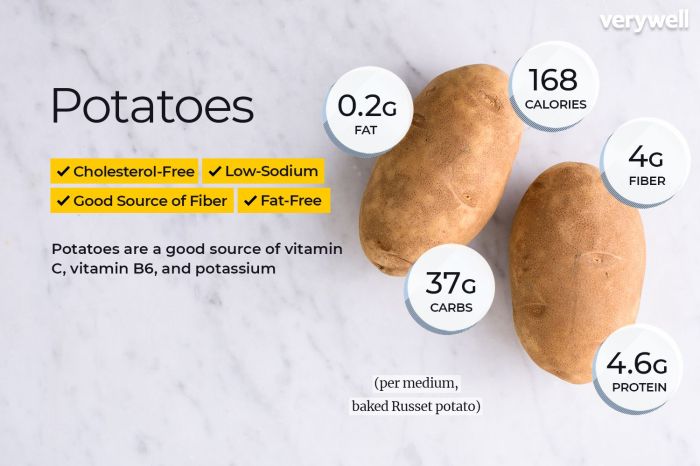Baked Potato as Part of a Balanced Diet: Nutrition Facts For A Baked Potato

Nutrition facts for a baked potato – The humble baked potato, often underestimated, is a remarkably versatile and nutritious food that seamlessly integrates into a variety of dietary plans. Its nutritional profile, rich in potassium and fiber, makes it a valuable component of a healthy eating strategy, regardless of specific dietary restrictions. Let’s explore how this seemingly simple food can be a cornerstone of a balanced and satisfying diet.Baked Potato Adaptability Across Dietary PlansThe baked potato’s adaptability is a key strength.
A baked potato, seemingly simple, offers a surprising nutritional profile; potassium, fiber, and vitamin C are all present in decent amounts. However, comparing it to the sugary rush of, say, jet puffed nutrition facts , reveals a stark contrast in macronutrient distribution. Ultimately, the nutritional value of a baked potato hinges on preparation; a plain potato beats out the processed snack hands down.
Its inherent nutritional value allows for easy incorporation into vegetarian, vegan, and even low-carbohydrate diets, with adjustments in toppings and portion sizes.
Vegetarian and Vegan Diets
A baked potato forms a substantial base for vegetarian and vegan meals. Naturally free from animal products, it provides ample carbohydrates and fiber. Toppings such as black beans, salsa, guacamole, roasted vegetables (like broccoli or bell peppers), or nutritional yeast (for a cheesy flavor) easily transform it into a complete and satisfying meal. The key is to select toppings rich in protein and other essential nutrients to compensate for any potential nutritional gaps.
Low-Carbohydrate Diets, Nutrition facts for a baked potato
While a baked potato is relatively high in carbohydrates compared to other vegetables, its inclusion in a low-carb diet is not entirely impossible. The focus here is on portion control. A smaller baked potato, coupled with toppings that are low in carbohydrates, such as sauteed spinach, cheese (in moderation), or a small amount of chili, can still provide a satisfying meal without significantly impacting carbohydrate intake.
Healthy Toppings for Enhanced Nutritional Value
Choosing the right toppings is crucial for maximizing the nutritional benefits of a baked potato. Instead of relying on high-fat, high-sodium options, prioritize toppings that add vitamins, minerals, and fiber.
Examples of Healthy Toppings
- Low-fat cheese: Provides calcium and protein.
- Chili: Adds protein and fiber, depending on the recipe.
- Steamed or roasted vegetables: Broccoli, cauliflower, green beans, and asparagus provide vitamins, minerals, and fiber.
- Greek yogurt: A good source of protein and calcium.
- Salsa: Adds flavor and vitamins.
- Avocado: Healthy fats and fiber.
These toppings enhance the potato’s nutritional profile, transforming it from a simple carbohydrate source into a more complete and balanced meal.
Incorporating a Baked Potato into a Well-Balanced Meal
To ensure a balanced meal, always consider incorporating other food groups alongside the baked potato. A well-rounded meal should include lean protein, healthy fats, and a variety of vegetables.
Sample Meal Plan
Here’s an example of a balanced meal incorporating a baked potato:
| Food Group | Item | Nutritional Contribution |
|---|---|---|
| Carbohydrate | Medium baked potato (skin on) | Fiber, potassium, vitamin C |
| Protein | 4 ounces grilled chicken breast | Lean protein, niacin |
| Vegetables | 1 cup steamed broccoli | Vitamins, minerals, fiber |
| Healthy Fat | 1 tablespoon olive oil (used in cooking) | Healthy monounsaturated fats |
This meal plan showcases how a baked potato can be part of a balanced and nutritious meal, providing a significant portion of the daily recommended intake of several essential nutrients. The synergy lies in the combination of carbohydrates for energy, lean protein for muscle building and repair, healthy fats for hormone production and nutrient absorption, and ample fiber and vitamins from vegetables for overall health.
Potential Health Benefits and Considerations

Baked potatoes, often unfairly maligned as a dietary villain, offer a surprisingly nuanced nutritional profile. While their carbohydrate content necessitates careful consideration, their nutritional benefits, when consumed as part of a balanced diet, are undeniable. Ignoring their potential health advantages due to a singular focus on their glycemic index is a mistake. A balanced perspective is crucial.The nutritional value of a baked potato is significant.
It’s a powerhouse of essential nutrients, offering benefits that extend beyond simple satiety. Understanding both the advantages and potential pitfalls is key to incorporating them effectively into a healthy lifestyle.
Potassium Content and Digestive Health
Baked potatoes are an excellent source of potassium, a crucial electrolyte vital for maintaining healthy blood pressure and fluid balance. Adequate potassium intake is associated with a reduced risk of stroke and hypertension. Furthermore, the fiber content in baked potatoes promotes healthy digestion, preventing constipation and supporting gut health. A single medium-sized baked potato can provide a significant portion of the daily recommended potassium intake.
The fiber also acts as a prebiotic, feeding beneficial gut bacteria and further enhancing digestive function.
Glycemic Index and Weight Management
The high glycemic index (GI) of baked potatoes is a valid concern, particularly for individuals with diabetes or those managing their weight. A high GI food causes a rapid spike in blood sugar levels. However, this effect can be mitigated significantly by consuming the potato with healthy fats and proteins. For example, topping a baked potato with Greek yogurt and broccoli will slow down the absorption of carbohydrates, resulting in a more gradual and sustained release of glucose into the bloodstream.
Furthermore, the fiber content itself helps to regulate blood sugar levels. Simply put, the glycemic impact of a baked potato is highly dependent on what accompanies it. Uncontrolled consumption of plain baked potatoes, especially in large quantities, can contribute to weight gain.
Role in Preventing or Managing Specific Health Conditions
The nutritional profile of the baked potato makes it a potentially valuable tool in managing certain health conditions. Its high potassium content assists in regulating blood pressure, benefiting individuals with hypertension. The fiber content aids in digestion and can be beneficial for those experiencing constipation or irritable bowel syndrome (IBS). However, it’s crucial to remember that baked potatoes should not be considered a standalone treatment for any medical condition; they are best utilized as part of a comprehensive, medically-supervised dietary plan.
Consulting a doctor or registered dietitian is always recommended before making significant dietary changes, particularly if managing a pre-existing health condition.
Visual Representation of Baked Potato Consumption
Imagine a balanced scale. On one side, we see a vibrant, healthy baked potato, adorned with toppings like chili, low-fat cheese, and steamed vegetables, representing the positive aspects: high potassium, fiber, and satiety. This side also depicts a person with healthy blood pressure and improved digestive function. On the other side, we see a plain, large baked potato with butter and sour cream, representing the negative aspects: high glycemic index, potential for weight gain if consumed in excess, and a person experiencing blood sugar spikes.
This visual emphasizes that the overall impact of a baked potato is significantly influenced by portion size and the accompanying foods.
Quick FAQs
Can I eat the potato skin?
Absolutely! The skin contains a significant portion of the fiber and nutrients.
Are baked potatoes high in calories?
Calorie content varies by size, but generally, a medium-sized baked potato is a moderate calorie source. Adding high-calorie toppings significantly increases the calorie count.
Are baked potatoes good for weight loss?
Baked potatoes can be part of a weight-loss diet, but portion control and healthy toppings are crucial. Avoid excessive butter, sour cream, or cheese.
How long should I bake a potato?
Baking time depends on the size of the potato and your oven. A medium potato usually takes about an hour at 400°F (200°C).
